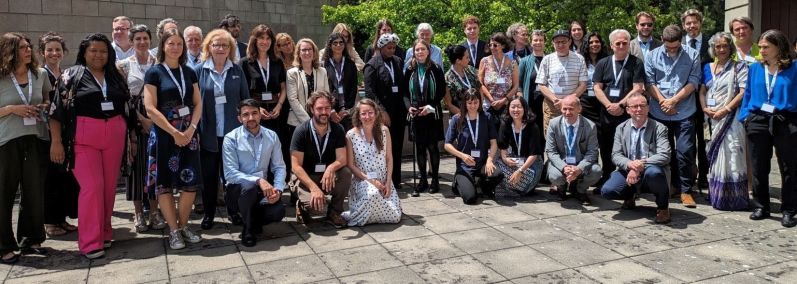UNESCO Human Rights Dialogue on the Right to Education 18-19 June 2024
On 18-19 June 2024, NORRAG’s Executive Director, Moira Faul and Senior Adivsor, Gita Steiner-Khamsi, took part in the Swiss Commission for UNESCO’s Human Rights Dialogues. In collaboration with experts from UN agencies, NGOs, and universities this initiative aims to strengthen the implementation of human rights in various sectors, including education, science, culture, communication, and information. The goal of this initiative is to promote partnerships and enhance learning within UNESCO and its networks regarding human rights issues. The initiative will involve a series of Dialogues held in Geneva, aiming to foster cooperation and efficiency among key partners with similar mandates and interests. Each Dialogue will serve as a platform to discuss current challenges and trends related to human rights, exchange perspectives on stakeholder collaboration, and explore ways to improve coherence and action within multilateral human rights mechanisms. The Dialogues are expected to produce a synthesis report that highlights emerging issues, challenges, key lessons, and recommendations for UNESCO and other actors in each respective field of human rights.
The dialogue on the Right to Education was co-organised by the Swiss Commission for UNESCO, UNESCO-IBE, the Special Rapporteur on the Right to Education, the Office of the United Nations High Commissioner for Human Rights (OHCHR), the university of Geneva and the UNESCO Liaison Office in Geneva.
This event brought together over 40 participants to discuss trends, challenges, and opportunities in ensuring equitable access to quality education. This dialogue focused on the impacts of privatisation, digitalisation and crises on the right to education, and also on the effectiveness of human rights mechanisms and public-private partnerships in addressing these 21st century issues.
In addition to commenting on the other panels, Moira Faul spoke specifically to the questions raised for the panel on education in emergencies.
1) How (and to what extent) are new crisis patterns and emerging issues affecting the right to education?
The majority of displaced populations are enduring protracted crises, often exacerbated by the impacts of climate change. Rising authoritarianism is fueling negative sentiment by scapegoating vulnerable groups, as seen in instances in the Global South and North. Additionally, there is a deliberate effort to undermine education, whether through individuals like Christopher Rufo in the United States or groups like Boko Haram in West Africa. These actions reveal a broader resistance to the type of socialization that education provides–beyond just schooling–which some actively oppose.
2) What policies are effective in safeguarding educational access for displaced populations?
Public-private partnerships (PPPs) and digital initiatives are frequently promoted, but it is essential to consider the challenges highlighted by previous panels, including the need to address the climate impacts of technology—particularly artificial intelligence—and the exploitation, both human and environmental, that we currently see. Additionally, concerns have been raised regarding the influence of major companies such as Microsoft, Alphabet/Google and Amazon in setting or avoiding regulations, tax avoidance, and also large social media companies for fanning the flames of conflict and polarisation.
In addressing the issues faced by displaced learners, it is crucial to also consider the needs of their teachers, including those who have been forcibly displaced, as emphasized in (see NORRAG’s Policy Insights and submission to the Special Rapporteur). Teachers are also missing in international education instruments and frameworks at the same time as they are increasingly the targets of attacks and offered little protection in policy and practice. INEE minimum standards effectively serve the need to recruit and train teachers in sudden onset crises, but not in the protracted crises in which most teachers work. Furthermore, initiatives like school feeding programs and social-emotional learning (SEL) should be extended to teachers to support their well-being and effectiveness, as they are expected to support their learners.
3) What long-term strategies can be implemented to prevent and mitigate the educational disruption caused by crisis situations?
Long-term strategies to prevent and mitigate educational disruption caused by crises include adopting a systems approach that builds on a clear understanding of the current situation, emphasizing the importance of addressing foundational challenges. It is essential to address the root causes of crises, recognizing that this extends beyond the realm of education. Efforts should aim at fostering positive peace (as described by the philosopher Johan Galtung), not merely security or negative peace.
Many actors—including NORRAG as a founding member—have supported the Geneva EiE Hub community’s recent statement on “Education – A Priority From the First Day of Every Crisis”, with a focus on protecting education from attacks, similar to efforts in the health sector. Nevertheless, we can’t lose sight of the ultimate aim. While EiE initiatives parallel to national systems exist to address immediate concerns, the ultimate goal is to facilitate learners’ and teachers’ paths to inclusion in national systems. Through national systems, forcibly displaced learners and teachers can better fulfil the right to quality education alongside broader goals of integration and contribution to their and host communities.
The state thus plays a crucial role in addressing educational needs, responding to the causes of crises, and countering scapegoating, with the focus not solely on funding but on strategic choices, as demonstrated by examples like Chad’s systematic inclusion of refugee learners and teachers in their national system.
Education’s role should be framed positively, highlighting its potential rather than its cost, including the transformative impact on gender equality, particularly for girls and women working in the home, which remains a significant issue even in high-income countries like Switzerland. There is also a need for the positive decolonization of minds in the Global North, the localization of priorities, and the endogenous development of curricula and training to reduce extractivism. The challenge is to move beyond the roles of missionary, mercenary, miner, or madman, and to transition from mere rhetoric to meaningful actions.

